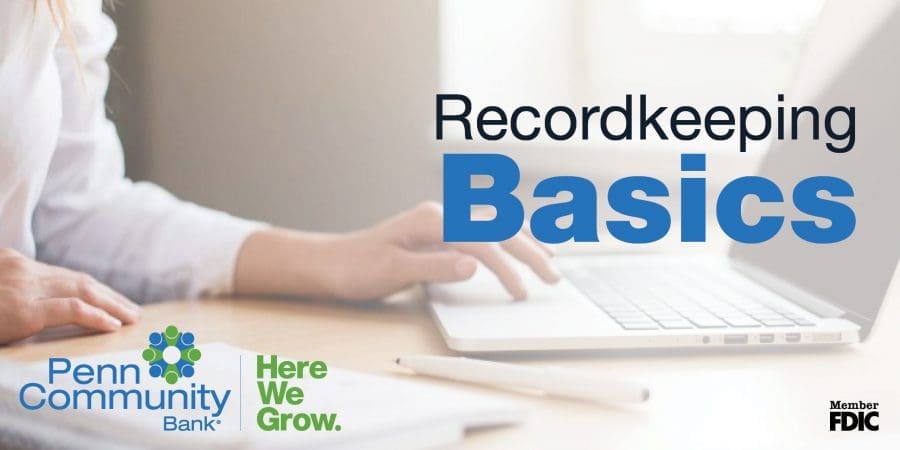
Keeping your records up-to-date, in a safe place and for the required legal period is tedious, but essential for your small business. Whether you store them in a shoebox in a manila envelope or use an advanced electronic storage retrieval system, you need a reliable way to keep your records.
The size and complexity of your business will dictate what methods you use. The important thing is to have a system in place from the beginning and to use it routinely.
Why the Need for Recordkeeping?
The primary reasons a small business needs to keep accurate records are:
- Detail tracking
- Planning
- Legal compliance
- Tax preparation
Detail tracking means keeping an eye on your customers, inventory, and sales. Without this data to refer to, you’ll never know if you are profitable or making progress towards profitability.
Keeping in touch with new and old customers, monitoring what types of goods they buy, and when, helps you plan your production schedule and marketing efforts. The more personal attention you can give a customer, the more favorably they will view you and your company. When you keep detailed records, you can reference them and keep an eye on preferences and buying habits.
Planning is done by tracking where you’ve been, where you are and where you are going with your business. You do that by looking at the day-to-day activities and financial records of your company.
It is harder to plan next year’s inventory if you do not have the data about what you ordered this year and last year, and how it sold.
Documentation for legal compliance and tax preparation can have grave consequences for your firm if they are not complete. These issues are looked at in more detail below.
Legal Compliance
The primary records you need for legal compliance are contracts, leases, other legal agreements, licenses, and permits. Contracts come in a variety of forms:
- Service contracts
- Sales contracts
- Financing contracts
- Leasing contracts
- Purchasing contracts
It is important to have them available so you can check the terms, conditions and obligations of both parties. You need to follow the terms of the contract in order to keep them legally in force. Always keep the original copy of all legally executed contracts for your legal safety.
Government agencies at the local, state, federal and even internationally issue licenses and permits that may be instrumental for your business. Examples include a license to operate your business in a given municipality, a seller’s permit, home occupation permit or food preparation permit.
States license certain professionals like doctors, accountants, and architects. You might be legally required to display these permits at your place of business. Contractors might be required to show proof of insurance. If you cannot produce the right licenses and other documents, you can be liable for fines or litigation.
Payroll and Personnel
There is a broad range of federal, state, and local laws that require any business with employees to produce current and old records for payroll and employment. You need to track many types of information, including:
- Hiring practices and how you evaluate prospective employees
- Social security numbers
- Hours worked
- Deductions from and additions to wages
- Income tax withholding
- Injury reports
- All types of employment records
- Fair Labor Standards Act required information
- Wages paid
- The method and basis of paying wages
This is a lot of records to keep for the average small business. Hiring a payroll service simplifies the process, as does using accounting and financial software. You can also reduce your record keeping by using an employment agency or by working with independent contractors.
Tax Requirements
Tax requirements at the local, state, and federal level are complicated and ever-changing. A new business can be overwhelmed by the demands of tax collectors. You need to keep your new records organized, but you also need to hang on to old ones. New records are essential for filling out tax forms for the current quarter and year, but forms going several years back can also be demanded by officials when they audit.
Getting the help of a professional accountant to keep your records up-to-date and organized is an investment in peace of mind. When tax collectors from any government level come calling, you will not have to put your business on hold while you try to figure out where everything is.
Records should be kept only as long as the government demands and then shredded. For example, tax returns need to be kept on file permanently. However, employee withholding records should just be kept for seven years.
Keeping records longer than is mandated for compliance can put you at risk of litigation. It also uses up space and takes time to keep in good condition and organized. So keep your records for the mandated period, and then get rid of them.
Your records, whether employment, legal or financial, contain the day-to-day story of your business. You need them to make realistic, useful plans for the future. You must be able to produce them to stay in compliance with legal requirements. Setting up a system for organizing and storing them, then using the system consistently, are essential steps for the prosperity of your company.


